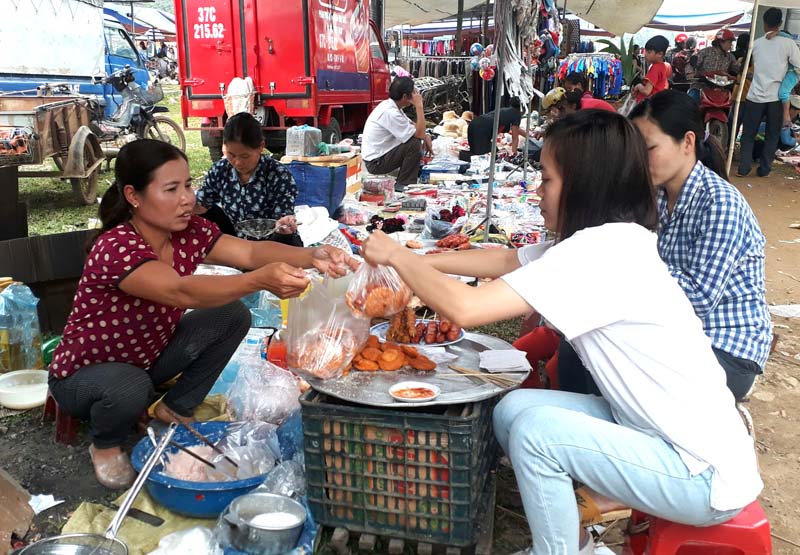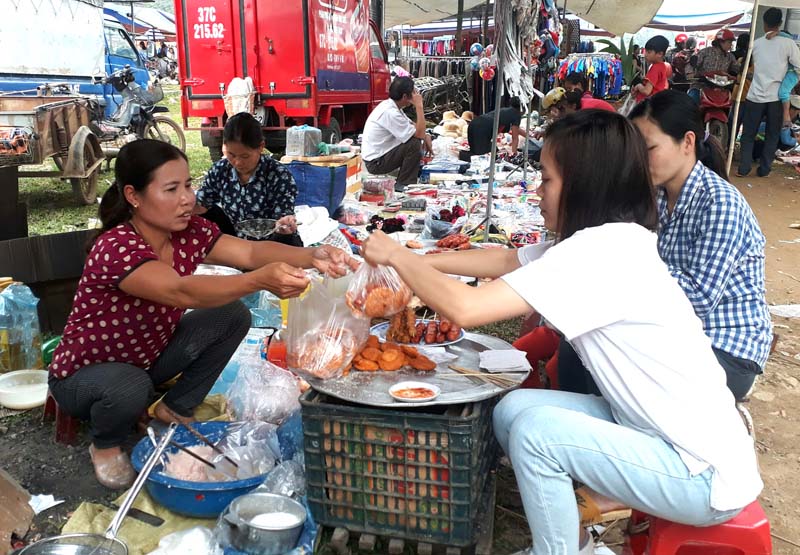
(HBO0 - The hot and yellow donuts covered with a layer of sugar on the outside have long been a fascinating gift at the rural markets. Today, there is no shortage of snacks in the countryside market, but donuts are still there with a special attraction not only for children, but also for adults.
 Donuts always
attract customers in the countryside markets. Photos are taken at
Phu Luong market, Quyet Thang commune (Lac Son).
Donuts always
attract customers in the countryside markets. Photos are taken at
Phu Luong market, Quyet Thang commune (Lac Son).
Despite being concreted, but the
fair markets in upland areas such as Van Son (Tan Lac), Ngoc Son (Lac Son), Bao
La (Mai Chau) or the fair markets in Da Bac district still preserve the
familiar feature of the countryside. They are the bundles of forest vegetables,
the bottles of honey from forest, the different kinds of vegetables, fruits and
food that people make and sell at the market. In some places, people still keep
the habit of keeping chicken, pigs and puppies in bamboo cages and bring them
to markets for exchange. In addition to these images, the country market has
its own unique flavors created from the gifts that have been described as
"delicious, nutritious, cheap”, typically donuts.
Six years ago, we had the
opportunity to go to the fair in Phu Luong commune, which is now merged as
Quyet Thang commune (Lac Son). The market takes place on Sunday morning every
week. At that time, this fair was quite simple, with the stalls built of bamboo
and covered with canvas. It took place right on a rainy day, but the market was
still crowded with buyers and sellers, in which, the stalls selling donuts were
still full of people. This time, the market schedule is still the same, but the
market has built according to the standards of new rural areas and it is
relocated to a wide position with the smoothly-running provincial road 436. The
stalls selling donuts and cendol are the most crowded with people in the
market.
Previously, 3 pieces of donuts were
bought with 500 dongs. Nowadays, a big donut costs 2 thousand dongs, a small
one costs 1 thousand dongs. With the development of society, in urban areas,
the fair has faded away. But in rural areas, markets are still the place of
trade and commerce. There are old people who have kept the habit of going to
the fair, and they are still eager to wait until the market day to go down to
the market and enjoy the hot, aromatic donuts. The donuts have been attached to
the countryside markets, with the typical and attractive flavors.
With an increasingly vibrant and widespread emulation movement aimed at building cultured residential areas and cultured families, Yen Thuy District has been making steady progress toward improving both the material and spiritual well-being of its people, while fostering a civilized, prosperous, beautiful, and progressive community.
Once lacking recreational spaces and community facilities, Residential Group 2 in Quynh Lam Ward (Hoa Binh City) has recently received attention for the construction of a new, spacious, and fully equipped cultural house. The project followed the model of state support combined with public contributions in both labor and funding.
The "All people unite to build cultural life" movement, which has been effectively integrated with Kim Boi district’s socio-economic development goals, is fostering a lively spirit of emulation across local residential areas, hamlets, villages, public agencies, and enterprises. In addition, through the initiative, traditional cultural values are being preserved and promoted, while community solidarity and mutual support in poverty reduction and economic development are being strengthened.
A working delegation of the Hoa Binh provincial People’s Committee led by its Permanent Vice Chairman Nguyen Van Toan on June 11 inspected the progress of a project to build the Mo Muong Cultural Heritage Conservation Space linked to tourism services in Hop Phong commune, Cao Phong district.
Born and growing in the heroic land of Muong Dong, Dinh Thi Kieu Dung, a resident in Bo town of Kim Boi district, in her childhood was nurtured by the sweet lullabies of her grandmother and mother. These melodies deeply imprinted on her soul, becoming an inseparable part of her love for her ethnic group's culture. For over 20 years, this love for her hometown has driven Dung to research, collect, and pass down the cultural values of the Muong people to future generations.
In the final days of May, the Ethnic Art Troupe of Hoa Binh Province organized performances to serve the people in remote, mountainous, and particularly disadvantaged areas within the province. These were not just ordinary artistic shows, but they were the meaningful journeys aimed at spreading cultural values, enhancing the spiritual life of the people and contributing to the preservation of ethnic minority cultural identities.



 Donuts always
attract customers in the countryside markets. Photos are taken at
Phu Luong market, Quyet Thang commune (Lac Son).
Donuts always
attract customers in the countryside markets. Photos are taken at
Phu Luong market, Quyet Thang commune (Lac Son).